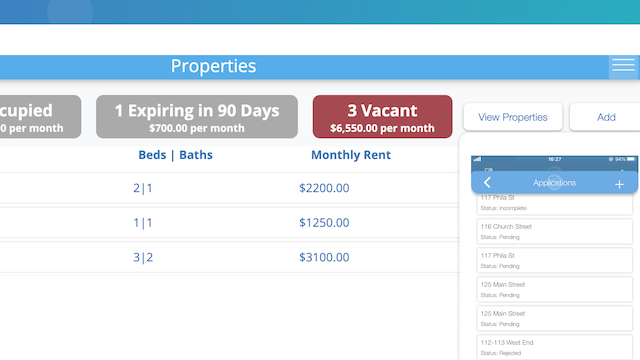RentRedi is a six-year-old software company with hundreds of thousands of units under management totaling close to $10 billion in value.
Are you receiving Inman’s Agent Edge? Make sure you’re subscribed for the latest on real estate technology from Inman’s expert Craig Rowe.
RentRedi is property management software for smaller, independent landlords.
Platforms: Browser; mobile responsive
Ideal for: Landlords, property managers, investors
Top selling points:
- UX highly specific to owner-operators
- Integrated application, tenant history checks
- Built-in rent payments
- Unit-by-unit reporting
- Low learning curve
Top concern:
While the software is fully mobile responsive, I feel a full companion app could offer it additional marketing advantages. But, this is minor issue, and likely the result of market feedback.
What you should know
RentRedi is a six-year-old software company with hundreds of thousands of units under management totaling close to $10 billion in value. It focuses on independent landlords — owner-operators — who make up the majority of rental property owners in America, according to PropertyManagement.com. The software tackles property oversight needs, including, maintenance, lease applications, tenant background checks, daily tasks, rent collection and lease oversight.
I’m kind of embarrassed for only now covering this product, as this is the world I lived in when last licensed. As a pocket of the industry, you’ll find no deeper collection of real estate wisdom than those who are successful in this segment. This is because the women and men who own the majority of residential rentals are not only on the business end of things, they’re on the ground level, too — literally. They know how to spread costs around, the value of preventative maintenance, when to apply rent increases, how to choose a tenant, how to treat tenants, and when to buy and sell.
On a personal note, I’d like to add that independent landlords are notably stigmatized. And yes, there are some real dirtbags out there. But if it helps, the majority of the bad ones aren’t getting rich. Smart landlords know how to treat people and understand the role they play in America’s housing industry. And software products like RentRedi are only making them better at it.

The software allows for granular control of each property, allowing the user to attach separate bank accounts to different properties, link leases to individual tenants in the same property and accept, respond to and track maintenance requests per unit. This gives the landlord a clear way to easily manage every repair and its related expense, something that Excel or a notebook and pen would make this important practice a great deal more challenging for most individual landlords.
I like that RentRedi divides Tasks and Maintenance in its customizable dashboard, which is presented as a series of widgets, for lack of a better term, each able to be turned on or off depending on work habits. Tasks are the everyday things per property, like dropping off an air filter or additional key, whereas Maintanenace filters active requests.

The same interface is where landlords will find submitted lease applications, which can originate from ads on all major rental portals that RentRedi facilitates for its users. The company built a proprietary lease application forms solution so it can more easily integrate with the rest of its system, making it easier for the software to connect lease terms with tenants, and to streamline automated alerts for late payments and lease milestones.
RentRedi also comes with its pre-qualification forms, background check workflow and signature module. Any form that an applicant uploads, using their phone’s camera, remains securely linked to that person for as long as they’re a tenant.

Renters can apply for a unit, monitor approval and pay rent and application fees online using multiple forms of electronic transfer and even cash through a Plaid connection. All payments are tracked, and late alerts and fee amounts are easily managed. If your state has limits on what you can charge, RentRedi won’t let you screw it up. It also prevents you from accepting any sort of partial payment during an eviction process, which as most landlords know, can create some serious long-term headaches.
If a landlord reaches a point where handling the physical aspects of their property is no longer desired, RentRedi has connected with fellow proptech Latchel, which manages requests and coordinates tenant services for landlords.

RentRedi can provide access to other team members, such as repair specialists (every landlord has a “roof guy,” an “AC guy” and so on) and other LLC members when appropriate. The admin functionality allows for access to what pertains to each team member.
In brief, this is a great tool for any landlord wanting to modernize how they manage their investments. It’s specific to the needs of the mom-and-pop managers and the inspired new investor. It also dug into a partnership with BiggerPockets.com to offer educational resources for investors, as well as the opportunity for BiggerPocket Pro members to access RentRedi on their dashboards.
It does use a third-party integration for accounting, and if you’re looking for more direct financial and banking functionality, BaseLane is worth a look. However, it’s pretty specific to single-family rentals. On that note, RentRedi is the better tool for tackling the sometimes unique nature of residential rental property, like rented mother-in-law suites, basement separate entries, Section 8s and funky old triplexes with different size units that smell like cats and dill pickles. And of course, standard apartment buildings and the like.
No, it’s not always a glamorous way to make money, but I’ve met more millionaires in this market segment than in residential sales.
Have a technology product you would like to discuss? Email Craig Rowe
Craig C. Rowe started in commercial real estate at the dawn of the dot-com boom, helping an array of commercial real estate companies fortify their online presence and analyze internal software decisions. He now helps agents with technology decisions and marketing through reviewing software and tech for Inman.
















Comments